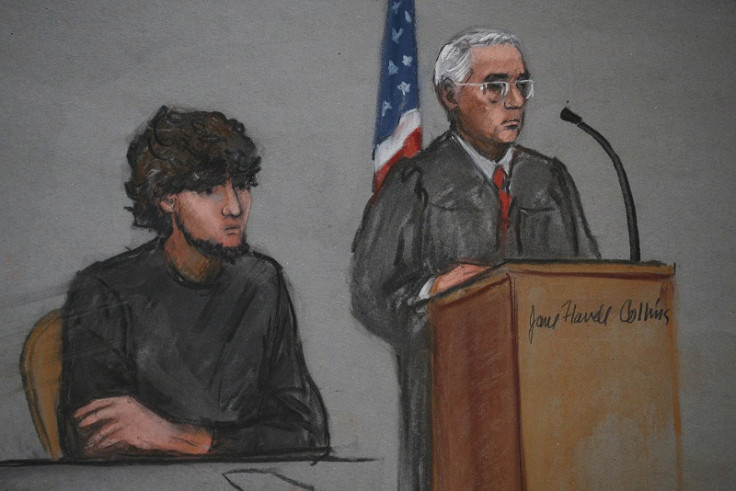Closing arguments given in the Boston Marathon bombing trial of Dzhokhar Tsarnaev

Closing arguments began in the case of Boston Marathon bomber Dzhokhar Tsarnaev on 6 April, as Tsarnaev's lawyers made one last attempt spare him from the death penalty.
The proceedings began around 10.30am local (3.30pm BST) with presiding Judge George O'Toole giving the jury instructions on how to deliberate.
Tsarnaev and his brother, Tamerlan, are accused of killing three and injuring hundreds using two pressure-cooker bombs during the Boston Marathon on 15 April 2013. Tamerlan later died in a shootout with Boston police.
Attorney Judy Clarke admitted that the then 19-year-old helped commit the bombings during her opening statement to the jury, NECN reported. "It was him," she said. However, Clarke insisted it was
"It was him," she said. However, Clarke insisted it was Tamerlan who was the mastermind of the bombing and that Dzhokhar had blindly followed his radicalised older brother.
17 death penalty charges
Prosecutors have highlighted the brutality in which the three victims were killed and hundreds others were maimed. Images of Tsarnaev standing behind the youngest victim, 8-year-old Martin Richard, and his family minutes before the explosions were also used.
According to NECN reporter Alysha Palumbo, if Tsarnaev is found guilty of just one of the 17 charges carrying the death penalty, the case will move on to the penalty phase.
Tsarnaev faces 30 charges and has pleaded not guilty to all counts. Among the charges are three charges of conspiracy to use a weapon of mass destruction, to bomb a public place and to maliciously destroy property; 27 counts of committing substantive offenses; and carjacking.
Judge O'Toole told jurors that any decisions on guilt must be unanimous, Palumbo reported. Jurors will have to go through all 30 counts and come to a unanimous decision on each to find guilt.
After 75 minutes of jury instructions, the court took a short break and were followed by Assistant US Attorney Aloke Chakravarty's closing arguments.
Closing arguments
Chakravarty said "the defendant brought terrorism to the backyards & Main St" and that the bombing "was a coordinated attack to maximize the terror," Palumbo reported.
The prosecutor also reiterated that Tsarnaev committed the attacks "together" with his brother and added that he admitted his guilt by writing in the Watertown boat he was ultimately captured in.
"I don't like killing innocent people, it is forbidden in Islam, but due to said (bullet hole) it is allowed," the message read.
According to NECN, the prosecution showed images and videos they have seen during the trial and go over the series of events leading up to Tsarnaev's arrest.
Chakravarty argued that "these were deliberate choices, political choices, he thought his values were more important than anyone else". He continued that the Tsarnaev brothers knowingly killed MIT police officer Sean Collier.
He continued that the Tsarnaev brothers knowingly killed MIT police officer Sean Collier.
Charkravarty said that both brothers had been radicalised "and believed jihad was the solution to their problems", Boston Globe columnist Kevin Cullen reported.
The prosecutor's closing arguments ended shortly before 1pm local time, with Judge O'Toole announcing that the defence's closing arguments will happen after a lunch break.
© Copyright IBTimes 2025. All rights reserved.






















